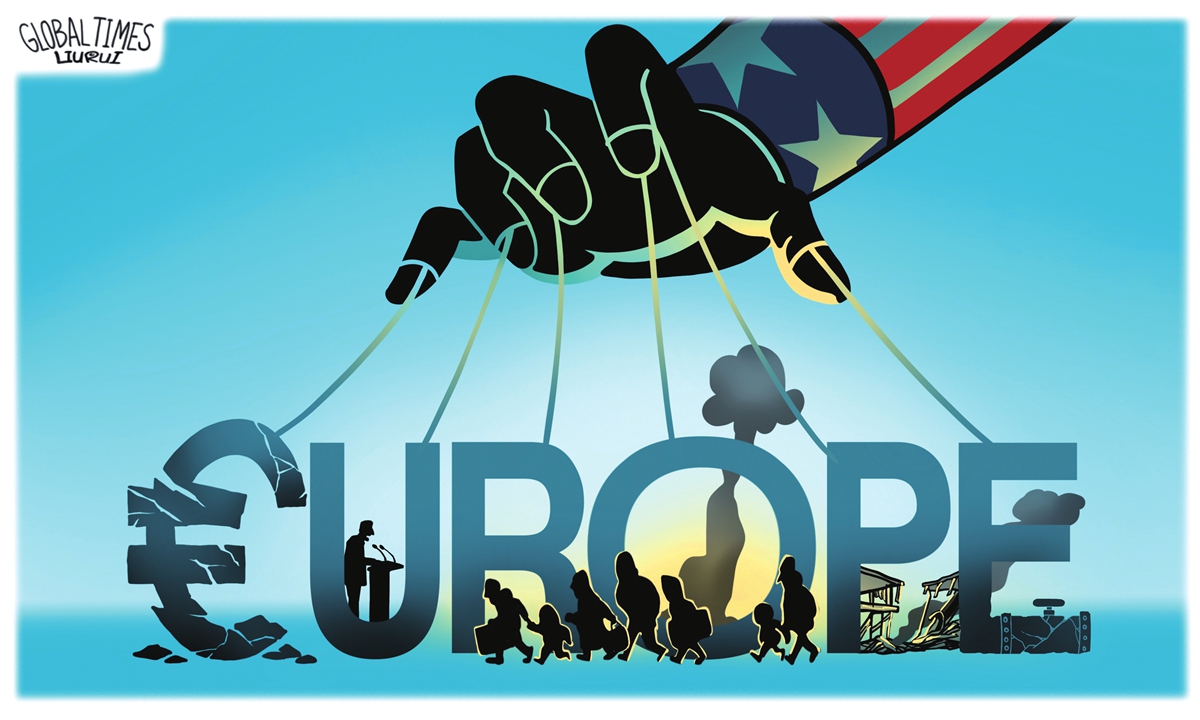
US' game of manipulation Illustration: Liu Rui/GT
As the Russia-Ukraine conflict continues, most relevant parties including Moscow, Kiev, Paris and Berlin have made frequent diplomatic efforts including direct talks between national leaders or the meeting between foreign ministers to seek a way out of the crisis, but Washington continues to supply weapons to keep the conflict from ending, experts said.
Analysts said Russia, Ukraine and EU states all want the conflict to end as soon as possible because they are the ones who are directly impacted, so even if they have differences, they would be the ones who sincerely want to make diplomatic efforts to effectively ease the crisis.
But the US, which seems like it is standing with Ukraine, actually does not care about restoring peace in Ukraine as it is too far from the conflict, and the ultimate goal of Washington is to extend the conflict and to maximize the damage to Russia, undermine the EU economy, and strengthen its military presence and control over the continent of Europe, experts said.
Leonid Slutsky, a Russian delegate to talks with Ukraine was quoted on Sunday as saying they had made significant progress and it was possible the delegations could soon arrive at a "joint position," Reuters reported. Ukrainian negotiator and presidential advisor Mykhailo Podolyak also said talks had become more constructive, according to media reports.
Russian President Vladimir Putin had a telephone conversation with French President Emmanuel Macron and German Chancellor Olaf Scholz on Saturday, and urged them to influence the Kiev authorities to stop "criminal acts" of Ukrainian "nationalist battalions," according to the Kremlin.
Macron and Scholz urged an immediate cease-fire and a diplomatic solution to the conflict in Ukraine, the German government said in a statement, noting the 75-minute talk as part of the ongoing international efforts to end the conflict.
Between the two countries mired in military conflicts, a high-level channel for dialogue has also been established. Russian Foreign Minister Sergey Lavrov and his Ukrainian counterpart, Dmytro Kuleba, agreed to continue negotiations over the conflict but failed to make progress in declaring a cease-fire during their meeting in Turkey on Thursday.
"This shows that Russia and Ukraine are showing good intentions and trying to find common ground as they talk," Cui Heng, an assistant research fellow from the Center for Russian Studies of East China Normal University, told the Global Times on Sunday.
However, it may not seem as optimistic as it looks, and there may not be a major breakthrough in agreeing on a pact in the near future, as Russian forces have started targeting western Ukraine, he said. The two sides would be able to reach final agreements when they are unable to get more from the battlefield.
However, the US, the key power which paid great efforts to hype up the conflict, is now trying to supply Ukraine with more weapons to keep up the conflict. According to Reuters, the US on Saturday said it would rush up to $200 million in additional small arms, anti-tank and anti-aircraft weapons to Ukraine, as Ukrainian officials pleaded for more equipment to defend against heavy shelling by Russian forces.
US President Joe Biden on Saturday authorized the additional security assistance, the White House said, paving the way for the "immediate" shipment of fresh military equipment to Ukraine, a senior administration official said, according to the report.
Biden's decision brings total US security aid provided to Ukraine to $1.2 billion since January 2021, and to $3.2 billion since 2014, according to senior administration officials, Reuters reported.
This reflects the fundamental differences between Europe and the US in terms of their interests and stances, said Chinese analysts.
"The Russia-Ukraine conflict is the foremost security threat to Europe. It is a matter of their own survival. For France and Germany, it is not only of geopolitical interests, but economic interests and even food security. Energy prices have soaring terribly high as Europe falls into panic, with the next pressing issue, the food. As the breadbasket of Europe, Ukraine has already missed its spring plowing, which means that Europe may face food shortages as Ukraine's grain imports decline," Cui said.
But for the US, Ukraine is too far from its own homeland security, and there are no core interests of the US deployed in Ukraine as it is more of a pawn to besiege Russia. Therefore, it could not hurt it much to see the conflict escalate. Instead, the deterioration of the security situation in Europe could be a positive factor for the US to strengthen partnerships, and the US can finally include Europe in its energy export destinations, observers noted.
The US providing Ukraine with weapons at this stage also cannot be seen as having the same interests with Ukraine, experts said. Although it seems that the US is willing to help Ukraine fight against Russia, the actual purpose of this act is different in nature.
"A cease-fire is not in line with US strategic interests but is a pressing need for Ukraine. The conflict has expanded to other areas, and at such a point, the US will certainly not be willing to see Russia and Ukraine reach a compromise. In other words, maintaining the sovereignty and territorial integrity of Ukraine is not the goal of the US," Cui Hongjian, director of the Department of European Studies at the China Institute of International Studies, told the Global Times.
The US is using Ukraine's crisis to realize its own strategic goal, but the goal itself is conflicting with that of Ukraine, he said, adding that the divergence will only become more and more obvious as things evolve and Russia and Ukraine eventually find a political settlement.




